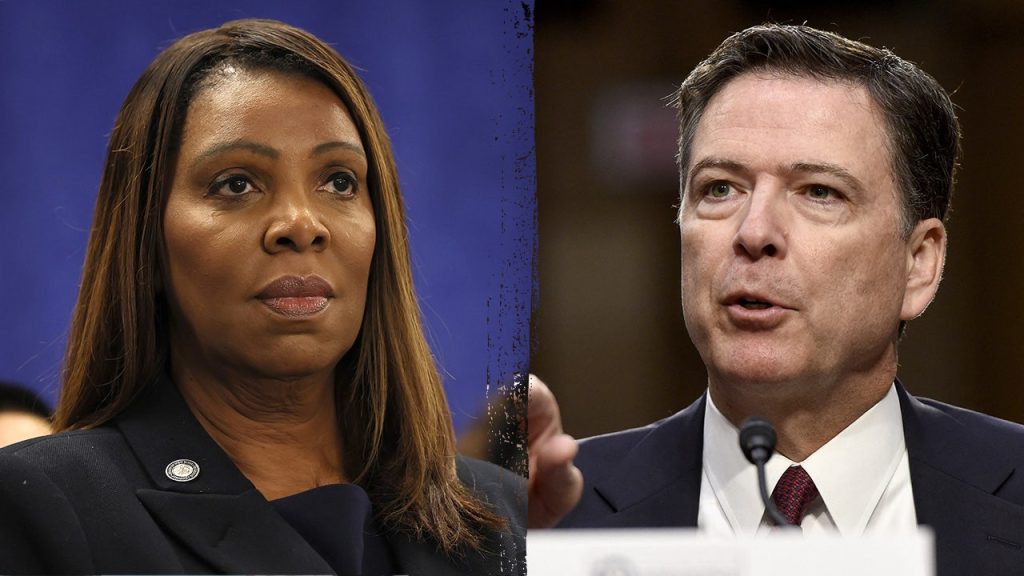Trump Administration Updates: A Week of Legal Battles and Political Maneuvers
In a significant judicial development this week, a federal judge dismissed indictments against former FBI Director James Comey and New York Attorney General Letitia James, citing procedural issues with the prosecution. Judge Cameron Currie ruled that the charges were brought by an improperly appointed U.S. Attorney, writing: “The Attorney General’s attempt to install Ms. Halligan as Interim U.S. Attorney for the Eastern District of Virginia was invalid.” Though dismissed without prejudice—meaning charges could be refiled—this ruling represents a momentary reprieve for both officials in what has become an increasingly contentious legal landscape. The Comey case involved alleged false statements, while James faced bank fraud charges, both part of a broader pattern of high-profile legal confrontations that have characterized recent political discourse.
The Trump administration continues pursuing its economic agenda with renewed focus on tariffs and international trade positioning. Commerce Secretary-designate Howard Lutnick expressed confidence that the Supreme Court would side with President Trump on tariff authority, potentially opening the door to significant citizen payouts—estimated at $2,000 per person. Trump himself defended his tariff strategy against critics, claiming they are “serving hostile foreign interests” and that the “full benefit” has yet to materialize. This economic approach aligns with what House Speaker Mike Johnson described as the Republican “affordability agenda,” which aims to address rising costs affecting American families. These economic policies come as the administration also pursues international security objectives, with Trump signaling plans to designate the Muslim Brotherhood as a terrorist organization.
International relations have taken center stage with several significant developments in U.S.-China relations. President Trump reportedly spoke directly with Chinese President Xi, signaling a potential shift in diplomatic engagement. Meanwhile, congressional investigations continue into American economic vulnerabilities, with a House panel demanding Amazon provide transparency about product origins from China. A separate investigation highlighted America’s diminished position in the critical rare earth minerals market, described as a “quiet concession” to Beijing in what experts call “mineral warfare.” These developments unfold as the FBI reportedly thwarted a major terrorist plot scheduled for Halloween, with officials stating, “People would have died” had the plot not been uncovered, exposing what they characterized as connections to a global terror network.
On Capitol Hill, partisan divisions continue to sharpen around military policy and international relations. Republican veterans in Congress accused Democrats of applying a double standard by supporting the Biden administration’s COVID-19 vaccine mandates for troops while expressing outrage over Trump’s comments about potential consequences for “treasonous” actions. The controversy extended to New York Representative-elect Zohran Mamdani, whose suggestion about arresting Israeli Prime Minister Benjamin Netanyahu prompted a Republican senator to introduce legislation to withhold funding from any such efforts. Despite these divisions, there were glimpses of effective bipartisanship, with reports highlighting how “one Alabama senator’s quiet diplomacy helped end the longest shutdown in US history,” suggesting that behind-the-scenes negotiation still plays a crucial role in governance.
The Pentagon entered the political fray with an unusual threat to court-martial a Democratic senator over a “refuse illegal orders” video, underscoring the tension between civilian oversight and military discipline. This controversy emerged as the administration shuttered its main DOGE office—dedicated to government waste reduction—though officials insist the mission to eliminate inefficiency continues through other means. These developments reflect broader questions about government authority, responsibility, and the proper boundaries between military and civilian leadership that have characterized recent political discourse.
At the local level, Representative-elect Mamdani, fresh off his victory in New York, pledged that New York City would remain a sanctuary city following what was described as a “chummy” meeting with President Trump—a surprising development given their political differences. The political consulting firm that helped propel Mamdani to victory is now reportedly targeting House Republican members in Pennsylvania, suggesting continued strategic electoral competition. Meanwhile, a “deep-pocketed conservative group once at odds with Trump” has apparently reconciled with the president and is now “all-in to help him win,” illustrating the ongoing realignment of political resources and alliances as the administration advances its agenda across economic, security, and governance priorities in what remains a deeply divided political landscape.


